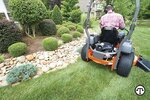

(NAPSI)—In spring, homeowners are eager to get outside and spruce up their yards. To help, the Outdoor Power Equipment Institute (OPEI), an international trade association representing outdoor power equipment, small engine, utility vehicle, golf car and personal transport vehicle manufacturers and suppliers, reminds you to keep safety in mind.
“Before you use a mower, trimmer, blower, power washer, chainsaw, pruner, portable generator or other piece of outdoor power equipment this season, it’s important to be up to date on handling and safety procedures,” said Kris Kiser, President and CEO of OPEI. “We’re all eager to get outside and enjoy our yards, but you also need to take the time to do maintenance to ensure your equipment operates safely for the season and is ready to get the job done.”
Here are tips to help:
Read your owner’s manual. Follow all guidelines for your outdoor power equipment and familiarize yourself with the controls. Review how to turn on, shut off, and use the equipment safely. If you have lost your manual, look it up online (and save a copy on your computer for easy reference in the future).
Inspect equipment. Check the air filter, oil level and the gasoline tank. Also check for loose belts and missing or damaged parts. Ensure all safety guards are in place. Replace any parts needed or take your equipment to a qualified service representative for servicing. If using electric equipment that relies on power cords, make sure cords are in good condition and not damaged.
Protect your power by using only E10 or less fuel in gasoline-powered outdoor power equipment. With today’s higher ethanol content fuels, most manufacturers are recommending a fuel stabilizer be used, especially if you don’t use up all the gas purchased right away. Some gas stations may offer 15 percent ethanol (E15) gas or higher ethanol fuel blends, but any fuel containing more than 10 percent ethanol can damage, and is illegal to use in, small engine equipment not designed for it.
Store fuel safely. Label your fuel can with the date of purchase and ethanol content of the fuel. Never put “old” gas in your outdoor power equipment. If you don’t know the date of purchase, dispose of the fuel in the can safely and buy fresh fuel. Always store fuel out of the reach of children or pets and in approved containers. You should never leave fuel sitting in the gas tank of your equipment for more than 30 days as it may cause starting or running problems or damage.
For battery-powered equipment, recharge your equipment only with the charger specified by the manufacturer. A charger that is suitable for one type of battery pack may create a risk of fire when used with another battery pack. Follow all charging instructions. Do not charge the battery pack or tool outside the temperature range specified in the instructions.
Store batteries safely. When the battery pack is not in use, keep it away from other metal objects, such as paper clips, coins, keys, nails, screws or other small metal objects, that can make a connection from one terminal to another. Shorting the battery terminals together may cause burns or a fire.
Clean your equipment and store it in a dry place. Remove any dirt, oil or grass. Clean equipment will run more efficiently and last longer. Never store your equipment in a place that is damp or wet.
Always keep kids and pets away when operating outdoor power equipment.
To learn more, go to www.opei.org. For information on safe fueling, see www.LookBeforeYouPump.com.